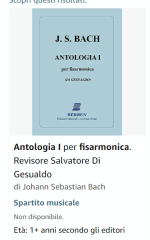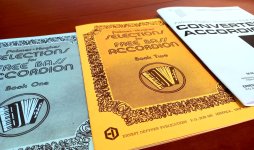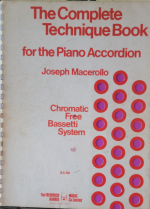Walker
🪗
Today I received some books I purchased through Amazon Italy.
I wanted to share the titles with you because I think they are wonderful materials, particularly for those who want to learn the accordion with Quint free bass system. There are also some wonderful resources for button accordionists too (C system).
Firstly, for the beginner:
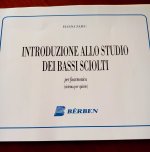
This book, Introduzione Allo Studio Dei Bassi Sciolti, by Eliana Zajec, contains 114 well thought out exercises to give a graduated approach in Quint free bass studies. This is a fantastic work for absolute beginners to build solid foundations with.
The second book I would like to share is a gem called 12 Pezzi Facili: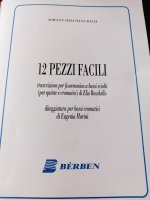
It is a transcription of some easy (and beautiful) Bach pieces fingered for both piano and button accordion, with both Quint free bass and C system free bass. Elio Boschello who transcribed the music was a renowned accordion teacher in Northern Italy and taught some world class accordionists. The chromatic accordion fingering is by Eugenia Marini. There is a delightful mix of numerous miniatures; Musetta, Minuetto, Polacca, Marchia, Aria.
The last book I would like to share with you is called Antologia I: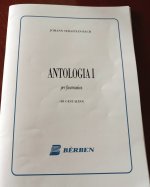
It is a collection of Bach pieces transcribed for accordion by 'the classical accordionist' Salvatore di Gesualdo. It contains a selection of music ranging from fairly easy to a little bit challenging, again with fingering for both piano accordion, button accordion and both Quint converter and chromatic converter bass systems. I note that the transcription and fingering (piano accordion with quint system) is by Salvatore Di Gesualdo himself, and the fingering for button accordion is by the great Claudio Jacomucci.
The list of pieces:
Dal Notebuch fur Anna Magdalena Bach:
Minuetto in sol maggiore (BWV Anh. 114)
Minuetto in sol minore (BWV Anh. 115)
Polonaise in sol minore (BWV Anh. 119)
Minuetto in la minore (BWV Anh. 120)
Musette in re maggoire (BWV Anh. 126)
Minuetto in sol maggiore (BWV Anh. 116)
Dal Klavierbuchlein fur Wilhelm Friedemann Bach
Kleine Praludien
In re minore (BWV 926)
In fa maggiore (BWV 927)
In fa maggiore (BWV 928)
Da "Sechs kleine Praludien fur Anfanger auf dem Klavier"
In do minore (BWV 934)
In re minore (BWV 935)
In re maggiore (BWV 936)
In mi maggiore (BWV 937)
In time, I hope to share more free bass accordion materials with you for piano accordion, button accordion, quint & chromatic free bass. These little books are incredible resources and I think they are worth their weight in gold.
For now I will leave you with a YouTube video of one of the lovely pieces in the last book - it's the little prelude in C minor BWV 934. I have chosen a performance on the pianoforte by Varvara Miagkova. I think it could sound incredible on the accordion if it's played as well as this...
I wanted to share the titles with you because I think they are wonderful materials, particularly for those who want to learn the accordion with Quint free bass system. There are also some wonderful resources for button accordionists too (C system).
Firstly, for the beginner:

This book, Introduzione Allo Studio Dei Bassi Sciolti, by Eliana Zajec, contains 114 well thought out exercises to give a graduated approach in Quint free bass studies. This is a fantastic work for absolute beginners to build solid foundations with.
The second book I would like to share is a gem called 12 Pezzi Facili:

It is a transcription of some easy (and beautiful) Bach pieces fingered for both piano and button accordion, with both Quint free bass and C system free bass. Elio Boschello who transcribed the music was a renowned accordion teacher in Northern Italy and taught some world class accordionists. The chromatic accordion fingering is by Eugenia Marini. There is a delightful mix of numerous miniatures; Musetta, Minuetto, Polacca, Marchia, Aria.
The last book I would like to share with you is called Antologia I:

It is a collection of Bach pieces transcribed for accordion by 'the classical accordionist' Salvatore di Gesualdo. It contains a selection of music ranging from fairly easy to a little bit challenging, again with fingering for both piano accordion, button accordion and both Quint converter and chromatic converter bass systems. I note that the transcription and fingering (piano accordion with quint system) is by Salvatore Di Gesualdo himself, and the fingering for button accordion is by the great Claudio Jacomucci.
The list of pieces:
Dal Notebuch fur Anna Magdalena Bach:
Minuetto in sol maggiore (BWV Anh. 114)
Minuetto in sol minore (BWV Anh. 115)
Polonaise in sol minore (BWV Anh. 119)
Minuetto in la minore (BWV Anh. 120)
Musette in re maggoire (BWV Anh. 126)
Minuetto in sol maggiore (BWV Anh. 116)
Dal Klavierbuchlein fur Wilhelm Friedemann Bach
Kleine Praludien
In re minore (BWV 926)
In fa maggiore (BWV 927)
In fa maggiore (BWV 928)
Da "Sechs kleine Praludien fur Anfanger auf dem Klavier"
In do minore (BWV 934)
In re minore (BWV 935)
In re maggiore (BWV 936)
In mi maggiore (BWV 937)
In time, I hope to share more free bass accordion materials with you for piano accordion, button accordion, quint & chromatic free bass. These little books are incredible resources and I think they are worth their weight in gold.
For now I will leave you with a YouTube video of one of the lovely pieces in the last book - it's the little prelude in C minor BWV 934. I have chosen a performance on the pianoforte by Varvara Miagkova. I think it could sound incredible on the accordion if it's played as well as this...
Last edited:

